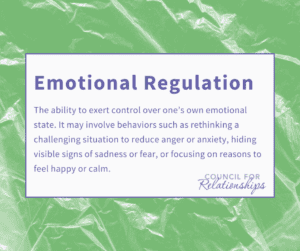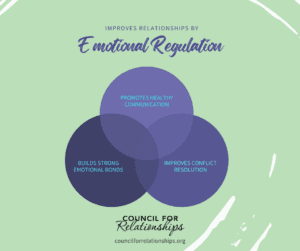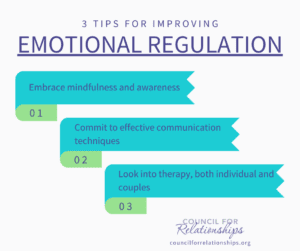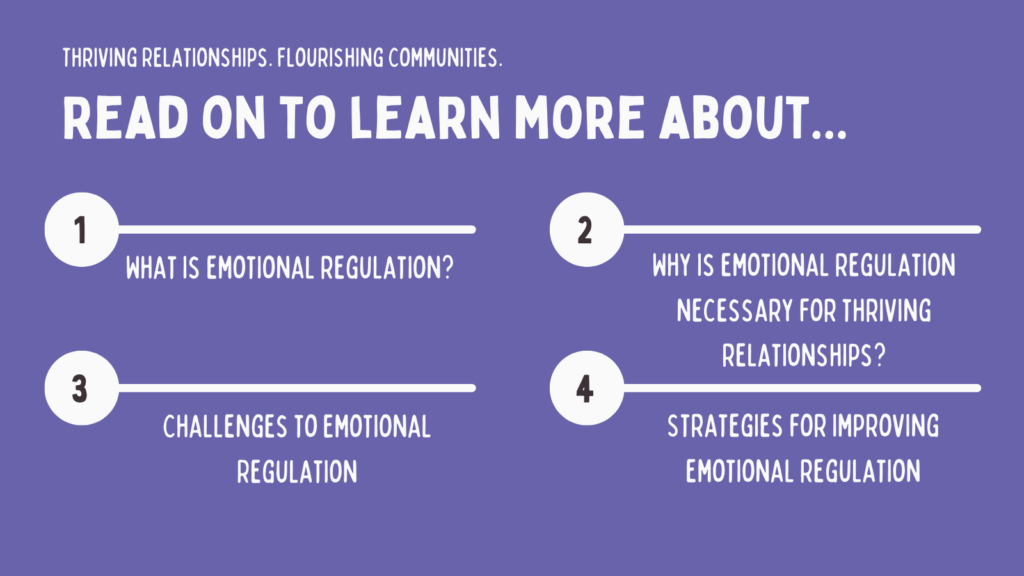Emotional Regulation: Everything You Need to Know to Improve Your Relationships
Many of us struggle with regulating (or managing) emotions. Looking inward and taking stock of our emotional regulation skills is critical to maintaining healthy adult relationships. Often, the source of conflict and struggle in relationships can be traced back to poor regulation of emotions by those in the relationship. Improving your relationships, though, takes more than memorizing an emotional regulation definition. Read on to learn more.
 What is emotional regulation?
What is emotional regulation?
Emotional regulation is crucial to maintaining healthy relationships, especially in adulthood. It involves the ability to recognize and manage one’s emotions constructively, preventing them from hijacking and negatively affecting the relationship. Emotional regulation can be challenging, but it is an essential skill to learn and improve with practice.
The initial step toward enhancing emotional regulation is understanding it. Regulating emotions involves being aware of one’s emotions, identifying the triggers that cause them, and learning how to manage them effectively. Regulating emotions is not about suppressing or pretending they do not exist but rather about acknowledging and finding healthy ways to express and manage them.
The importance of regulating emotions in adult relationships cannot be overstated. It helps partners communicate more effectively, reduce conflicts, and build trust and intimacy. On the other hand, emotional dysregulation or poor emotional regulation can lead to misunderstandings, hurt feelings, and even relationship breakdown. Therefore, individuals must develop and apply emotional regulation skills in all their relationships.
Regulating emotions involves the ability to manage and respond to one’s own emotions healthily and constructively. It encompasses the cultivation of emotional awareness, emotional acceptance, and emotional expression. Emotional awareness involves recognizing and identifying one’s own emotions. Emotional acceptance consists of acknowledging and accepting one’s emotions without judgment. Emotional expression involves communicating one’s emotions in a way that is respectful and constructive.
Developing emotional regulation skills takes time and practice. It involves learning to recognize and identify one’s emotions and understanding the triggers that lead to emotional dysregulation. It also involves developing healthy coping strategies, such as mindfulness, deep breathing, and physical exercise.
Overall, emotional regulation is a crucial skill for maintaining healthy adult relationships. By learning to manage and respond to one’s own emotions healthily and constructively, individuals can improve communication, manage conflict, and maintain healthy boundaries.
 Why is emotional regulation necessary for thriving relationships?
Why is emotional regulation necessary for thriving relationships?
Here are some reasons why emotional regulation is essential in adult relationships:
- Promoting healthy communication
- Building strong emotional bonds
- Conflict resolution
Promoting Healthy Communication
Emotional regulation allows individuals to communicate effectively with their partners. When individuals can manage their emotions, they are less likely to react impulsively or say things they do not mean. This helps couples productively work through issues.
Building Strong Emotional Bonds
Regulating emotions also helps build strong emotional bonds between partners. When individuals can regulate their emotions, they can better empathize with their partners and understand their perspectives. This creates a more profound emotional intimacy and strengthens the bond between partners.
Conflict Resolution
Emotional regulation is essential for conflict resolution in adult relationships. When individuals manage their emotions, they can better approach conflicts calmly and rationally. This allows them to work through issues and find solutions for both partners.
Challenges to Emotional Regulation
Challenges that affect emotional regulation can lead to dysregulation, which is the inability to manage emotions effectively. It can lead to impulsive behavior, mood swings, and difficulty maintaining healthy relationships. In adult relationships, emotional dysregulation can manifest in various ways, such as anger, jealousy, or anxiety outbursts. Here are some areas that can cause challenges in regulating emotions:
- Effects of past traumas
- Impact of mental health issues
Effects of Past Traumas
Another challenge in emotional regulation in adult relationships is failing to recognize the impact of past traumas. Past traumas, such as childhood abuse, neglect, or abandonment, can affect one’s ability to regulate emotions. Trauma survivors may struggle with emotional dysregulation, leading to difficulty forming and maintaining healthy relationships. Additionally, trauma survivors may have difficulty trusting others, which can further complicate emotional regulation in relationships.
Impact of Mental Health Issues
Mental health issues can also challenge emotional regulation in adult relationships. Conditions such as depression, anxiety, bipolar disorder, and borderline personality disorder can affect one’s ability to regulate emotions effectively. These conditions can lead to emotional dysregulation, affecting the quality of relationships. For example, individuals with depression may struggle with sadness and hopelessness, making it difficult to connect emotionally with their partners.
 Strategies for Improving Emotional Regulation
Strategies for Improving Emotional Regulation
Since regulating emotions is such a crucial skill for developing and maintaining healthy relationships, here are some effective strategies for enhancing emotional regulation in adult relationships:
- Mindfulness and awareness
- Effective communication techniques
- Therapeutic interventions
Mindfulness and Awareness
Mindfulness is the practice of being present in the moment and aware of one’s thoughts and emotions without judgment. It is a powerful tool for enhancing emotional regulation in adult relationships. By practicing mindfulness, individuals can learn to recognize and respond to emotional triggers more constructively.
One effective way to practice mindfulness is through meditation. Meditation can help individuals become more aware of their thoughts and emotions and develop greater control over them. Other mindfulness techniques include deep breathing exercises, yoga, and journaling.
Effective Communication Techniques
Effective communication is essential for building and maintaining healthy relationships. It is also a crucial tool in enhancing emotional regulation. By communicating effectively, individuals can constructively express their emotions and minimize misunderstandings and conflicts.
One effective communication technique is active listening. Active listening involves paying close attention to what the other person is saying and responding in a way that shows understanding and empathy. Other effective communication techniques include using “I” statements, avoiding blame and criticism, and focusing on solutions rather than problems.
Therapeutic Interventions
Therapeutic interventions can be a powerful tool for enhancing emotional regulation in adult relationships. Therapy can help individuals develop greater self-awareness and learn new skills for managing their emotions.
Cognitive-behavioral therapy (CBT) is one type of therapy that can be particularly effective for enhancing emotional regulation. CBT focuses on identifying and changing negative thought patterns and behaviors contributing to emotional dysregulation. Other therapeutic interventions that may be helpful include mindfulness-based therapies, Emotionally Focused Therapy (EFT), which helps rekindle emotional attachments, and couple’s therapy.
Improve Relationships by Understanding Emotional Regulation
Emotional regulation is a critical aspect of adult relationships. It is essential for building and maintaining healthy relationships, allowing individuals to communicate effectively, resolve conflicts, and build trust. Effective emotional regulation requires self-awareness, self-control, and the ability to empathize with others.
Several strategies can help individuals improve their emotional regulation skills. These include mindfulness practices, such as meditation and deep breathing, as well as CBT and other forms of therapy. Developing healthy coping mechanisms, such as exercise, hobbies, and social support, is also essential.
Overall, regulating emotions is a complex and multifaceted skill essential for healthy adult relationships. By developing and improving emotional regulation skills, individuals can build stronger, more fulfilling relationships with others.
Get Matched with a CFR Therapist
Get matched with one of our over 85 Staff Therapists today.
See our Therapist & Psychologist Directory to find a different CFR therapist or psychiatrist near you.
More from CFR
Am I a Unicorn? A Therapist & Child of Holocaust Survivors On the Israel-Hamas War

